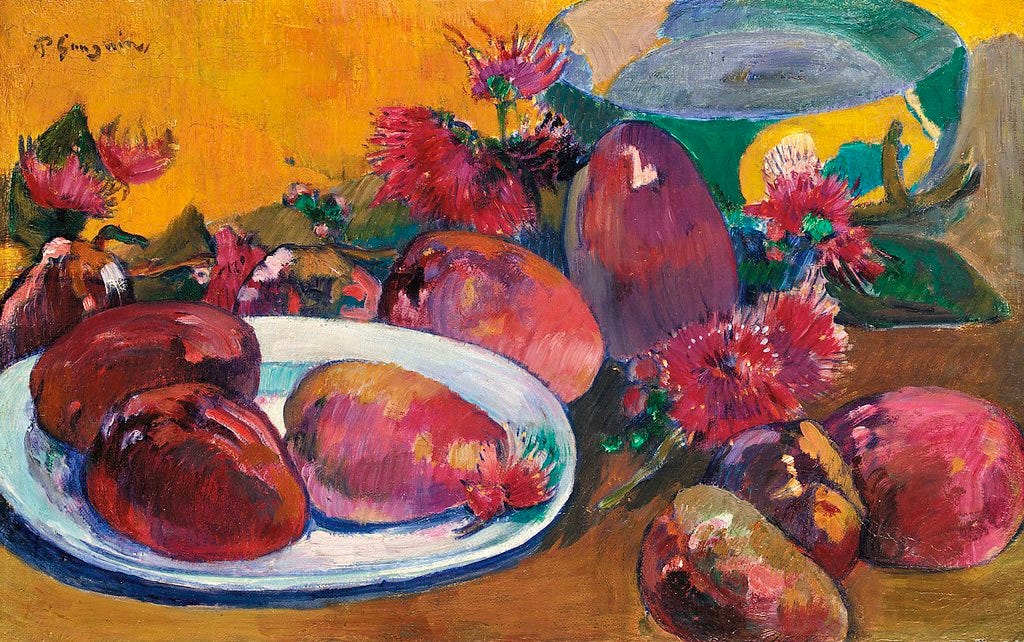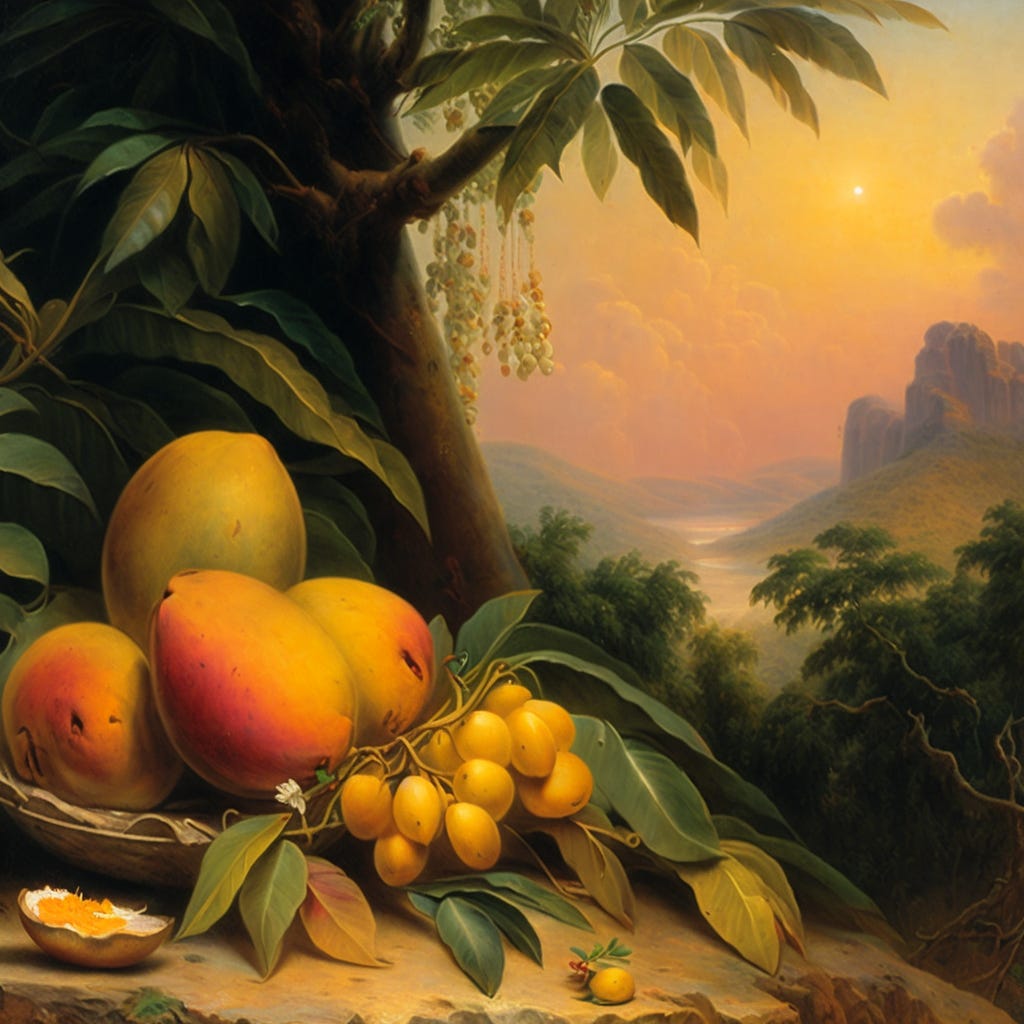One of the strangest on-going stupidities of our culture is the utter shabbiness of our luxury goods. They’re almost universally ugly, flimsy, and dispiriting, and consuming them requires you to debase yourself by pretending they’re not. Even worse are "luxury experiences": almost invariably banal status signifiers consumed in the company of the most vacuous, tasteless people on Earth.
Now, let’s consider the alternative. A proper luxury deepens our love of life while indulging our senses. It is also, by definition, excessive: it is unnecessary, it is extra, it is a bonus.
A perfect example of this is a really good mango. You almost certainly have never had a really good mango. You may think you have because you had a very tasty mango that one time. But let me assure you, that mango was a sad sham. Even if it was harvested at just the right time, handled and transported with white glove treatment, and then consumed at precisely its ripest moment, it still only lived up to its maximum genetic potential, which is pitifully low, by mango standards. You see, that mango was probably bred to suit the commercial demands of the early 20th century, namely disease resistance, yield, transportability, and appearance. Flavor and aroma were largely unimproved, meaning, as long as they were deemed acceptable, the breeding program was over.
A really good mango is bred with the opposite priorities: flavor and aroma are paramount, while any other positive attributes are a happy accident. If a truly excellent mango is hard to grow, low yielding, and difficult to transport, then it is even more luxurious because it is even more excessive: its existence necessitates excess labor, time, and energy to be devoted to something so non-essential.
This is the appropriate context in which to consume luxuries: when the necessities are taken care of. To consume luxuries when the necessities are not taken care of is an obscenity, and it marks the consumer as a narcissist and a fool.
This, of course, is the context in which all luxury consumption takes place under capitalism, leaving you the option of either never consuming luxuries or consuming them at the cost of your dignity. This is what we might call the spiritual poverty of luxuries in our current civilization. To be forced to choose between denying ourselves luxuries—one of life’s great pleasures—or to stare hard into the face of a hungry person (either someone else or yourself) while enjoying excess is a profoundly miserable choice that can only lead to bone-deep exhaustion, denial, or mental illness.
So the first great gift that a new civilization can give us is the opportunity to consume luxuries appropriately. This will require a political economy that does not immiserate people by design, but instead provides for universal subsistence & the means to live a thriving life. This shouldn’t be difficult—despite what the apologist ghouls for capitalism are constantly saying—because there is plenty of stuff for everyone and there always has been. That isn't a byproduct of capitalism or industrialism or any other human construct: it’s the incredible good fortune of living on a planet filled with life. We have always had the capacity to live a safe, rich life, and at times we have. We can again, and when we do, consuming luxuries will be that much more delicious because we will do so with a clear conscience. We will no longer need to ignore the unnecessary suffering of others when we indulge in luxuries, an act which warps our humanity each and every time we do it.
And yet, here we are, living in a morally compromised world containing exceptionally tasty mangos, which you have not eaten. But truly great mangos, like all other luxuries, are mostly either the result of capitalist firms attempting to profit through product differentiation, or they are the byproduct of the bourgeoisie dedicating their spare time to resource-intensive hobbies (a notable exception being improved Indian mangos like Alphonso and Vietnamese mangos like Nam Dok Mai, which have a complex history rooted in colonialism). In both cases, they are reliant on either the commodification of nature and/or the exploitation of labor. Public breeding programs attached to universities invariably serve the demands of the commodity market. This profanes our luxuries. Mangos should be bred and shared by free people spreading human joy for its own sake.
Now imagine not only that we can consume luxuries with a clear conscience, but that we can consume luxuries that don’t suck shit. In order to imagine this—to really understand just how good a primitive luxury can be—I encourage you to seek out a really good mango, despite all the barbarity of the civilization that made it. You will need to find a source for a perfectly grown Sugar Loaf or a Coconut Cream or a Peach Cobbler or a Triple Sec. They are generally only grown in South Florida; they are bred by a single extremely weird company called Zill High Performance Plants; they are only ripe for a couple months (at most) out of the year; and they are somewhat hard to get. By mango standards, they can be expensive, around $6-12 each. They are, however, so astoundingly delicious that they rival opioids and orgasms on the pleasure scale.
And yet, instead of filling our life with such utterly attainable luxuries, such inexpensive, astounding, joyful, nourishing, and unlikely sources of pleasure, our civilization drowns us in insipid garbage. Imagine a civilization that didn’t. Imagine, instead, one that made nearly unlimited space for the breeding, cultivation, and distribution of life-changingly delicious mangos.
These are the roses of "bread and roses" fame, and yet we are too often embarrassed to talk about how the roses might smell because of the lack of bread. This is perfectly understandable, but failing to envision just how rich and blissful the roses might smell leads to an impoverished education for our desire.
As a result, our utopian vision has become myopic in the extreme, limited to imagining a smoothly functioning version of consumer capitalism, absent its horrific exploitation and maddening dysfunction. A post-capitalist world that preserves capitalism's material culture is a utopia made of boiled dog shit. It’s one in which we continue to putrefy our humanity by consuming trash and pretending to enjoy it, like grinning pâté geese choking down raw sewage.
It’s also one that would lead to our extinction. It is not merely capitalism’s cancerous growth imperative leading us to the brink of collapse, it is also industrialism’s robotic consumption of our biosphere and its ceaseless pollution of the same. Socializing a doomsday machine won’t save us; it will only make our unhappy end a more egalitarian affair.
A world awash in primitive luxuries like mind-blowing mangoes is fully compatible with a habitable planet and a meaningful life. If we somehow manage to get our act together in a hurry—to gain some serious collective maturity & political will before it’s too late—we can enjoy a just world with transcendent mangoes, life-saving modern technology, and a livable planet. Eco-socialism with a dash of industrialism lite.
That is a worthy utopia: one where the luxuries are primitive, the medicine is modern, and the air is clean and free.
—The Last Farm










i spent a month this last winter on an abandoned mango orchard in Ecuador - life changing mangos indeed
Excited to have found this substack! You write in a funny and extremely convincing way.
This question of luxury matters a whole lot to the kind of future we're going to build.
I wrote about it from my spot in North London, with a little help from William Morris and the Paris Communards: https://gregfrey.substack.com/p/well-what-do-we-want
It's what you said, but with others!
x